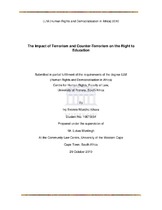| dc.contributor.advisor | Muntingh, Lukas | |
| dc.contributor.author | Kihara, Ivy Evonne Wanjiku | |
| dc.contributor.other | | |
| dc.contributor.other | Faculty of Law | |
| dc.date.accessioned | 2013-08-08T10:31:56Z | |
| dc.date.available | 2011/10/13 10:56 | |
| dc.date.available | 2011/10/13 | |
| dc.date.available | 2013-08-08T10:31:56Z | |
| dc.date.issued | 2010 | |
| dc.identifier.uri | http://hdl.handle.net/11394/1884 | |
| dc.description | Magister Legum - LLM | en_US |
| dc.description.abstract | After the 9/11 terrorist attacks in the United States of America, there has been a shift in the policies of many countries to combat terrorism. Terrorism has had a devastating effect on many citizens of the world. These include 'the enjoyment of the right to life, liberty and physical integrity of victims. In addition to these individual costs, terrorism can destabilise Governments, undermine civil society, jeopardise peace and security, and threaten social and economic development. All of these also had a real impact on the enjoyment of human rights. Therefore the fight to curb further terrorist attacks is paramount. States are charged with the responsibility of curbing terrorism by their citizens. But with responsibility comes obligations to the citizenry.2 States should therefore not engage in policies or actions that further deprive others of their enjoyment of human rights. This is well put by Hoffman when he says history shows that when societies trade human rights for security, most often they get neither. | en_US |
| dc.language.iso | en | en_US |
| dc.publisher | University of the Western Cape | en_US |
| dc.subject | Children's rights | en_US |
| dc.subject | Children | en_US |
| dc.subject | Social conditions | en_US |
| dc.subject | Human rights | en_US |
| dc.subject | Right to education | en_US |
| dc.title | The Impact of Terrorism and Counter-Terrorism on the Right to Education | en_US |
| dc.type | Thesis | en_US |
| dc.rights.holder | University of the Western Cape | en_US |
| dc.description.country | South Africa | |

